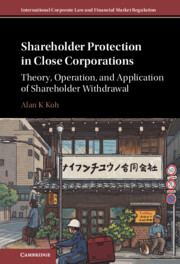 Shareholder Protection in Close Corporations
Shareholder Protection in Close Corporations from Part 2 - Operation
Published online by Cambridge University Press: 14 October 2022
Chapter III centres on the jurisdiction-neutral analytical framework applied in Chapters IV–VII, the target jurisdiction-specific chapters. The analysis covers the history, grounds, scope of protection, applicable parties, and the mandatory/default nature of each jurisdiction’s withdrawal remedy. Key findings from each jurisdictional chapter are summarised and compared, with salient similarities and differences, such as the fault/non-fault distinction, between the jurisdictions in these aspects highlighted. Observations about the legal actors (judges, legislators, scholars) involved in the creation and development of withdrawal regimes, and other themes emerging from this, are made. Further, this Chapter identifies the phenomenon of ‘spontaneous functional convergence’ of the four jurisdictions towards two distinct conceptual models of withdrawal (‘corrective’ and ‘insurance’ models), situating this contribution within the broader corporate law convergence and divergence debate. The comparative findings and insights from the four target jurisdictional studies in this Chapter form the basis of a model withdrawal remedy that is presented in Chapter VIII.
To save this book to your Kindle, first ensure no-reply@cambridge.org is added to your Approved Personal Document E-mail List under your Personal Document Settings on the Manage Your Content and Devices page of your Amazon account. Then enter the ‘name’ part of your Kindle email address below. Find out more about saving to your Kindle.
Note you can select to save to either the @free.kindle.com or @kindle.com variations. ‘@free.kindle.com’ emails are free but can only be saved to your device when it is connected to wi-fi. ‘@kindle.com’ emails can be delivered even when you are not connected to wi-fi, but note that service fees apply.
Find out more about the Kindle Personal Document Service.
To save content items to your account, please confirm that you agree to abide by our usage policies. If this is the first time you use this feature, you will be asked to authorise Cambridge Core to connect with your account. Find out more about saving content to Dropbox.
To save content items to your account, please confirm that you agree to abide by our usage policies. If this is the first time you use this feature, you will be asked to authorise Cambridge Core to connect with your account. Find out more about saving content to Google Drive.